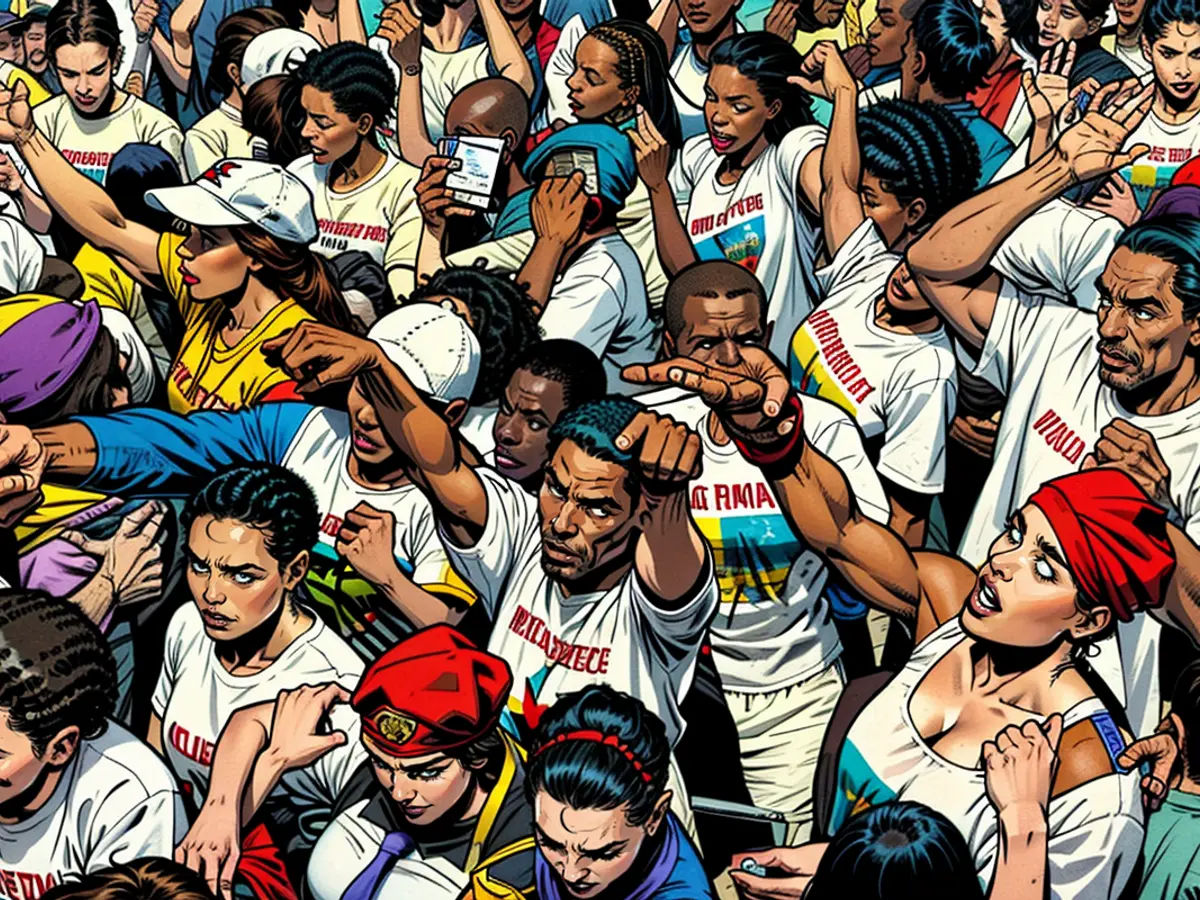Commentary: The Significance of Juneteenth and Haiti's Resilience in the Light of Renewal
Disregarding conventional wisdom, throughout history, fundamental liberties such as bodily autonomy and the liberty to express our thoughts truthfully, have been denied to a vast portion of humanity. These freedoms have been fought for, defended, and then fought for again. No group has embodied this history more than Black people in the United States and across the wider African diaspora.
Juneteenth is a commemoration of this hard-earned Black freedom, celebrated on June 19 in recognition of the day in 1865 when slaves in Galveston, Texas, first learned from Union soldiers that they were free. Although this news arrived more than two years after President Lincoln signed the Emancipation Proclamation, many Black Americans come together each year on this date to celebrate with festive picnics featuring red-colored food and kola nuts - symbols of Africa and resistance. Embracing cheerfulness and camaraderie is a long-held practice for persevering through relentless suffering.
As a Haitian American, Juneteenth serves as an inspiration for a broader perspective. In 1804, 220 years ago, Haiti gained its independence from slavery. But freedom often entails significant sacrifices. Juneteenth provides a reminder that there is usually retaliation when those who would restrict the freedom of everyone feel threatened, especially when those who had been oppressed assert their claim to it.
This was indeed the case for the freed Black people of Texas, whose servitude remained unjustly extended.
And it was the case for the Black residents of the newly formed nation, named “Ayiti,” the land of mountains, by the indigenous Taino population largely annihilated by the invaders.
Following the people of Haiti's successful uprising against French colonial enslavement, in 1825 the fledgling Caribbean nation was compelled to pay crippling reparations to France in exchange for recognition of their independence, supposedly for plantation owners who had lost their "property." Despite this crippling burden, Haiti managed to pay off this unjust and burdensome debt. Yet, this wasn’t enough: The country's national treasury and assets were seized by the United States during a Wall Street-backed occupation that lasted from 1915 to 1934. August of this year marks 90 years since the end of this now nearly forgotten occupation.
America's Juneteenth narrative and the ongoing quest by Black Americans for freedom share many similarities with Haiti's struggle for autonomy and its pursuit of a semblance of prosperity. Certainly, the violence, poverty, and struggle that plague Haiti today can be traced back to a history of systemic exploitation, much like the poverty and deprivation that disproportionately affect some Black American communities can be traced back to the original sin of slavery and the oppressive Jim Crow era that followed.
There is one significant figure who links both the Black American and the Haitian struggles for freedom and dignity: The illustrious author and anthropologist Zora Neale Hurston. Born in the American South, Hurston later journeyed to Haiti from 1936 to 1937.

In Haiti, despite its difficult beginnings, Hurston found fertile ground for her expansive literary imagination, alongside her groundbreaking anthropological research. She remains a subject I have extensively studied over the years, both as a muse and inspiration for my debut novel set in Haiti during the time she lived there. Even 133 years after her birth, Hurston has much to teach us about transcendence in the face of seemingly insurmountable odds.
Hurston grew up in Eatonville, Florida, the oldest incorporated Black town in the U.S., where her father served as mayor. Similar to my parents growing up in Haiti, she was accustomed to witnessing Black people in positions of power.
She lowered her actual age by 10 years to attend public high school in Baltimore after a challenging adolescence following her mother's death. By 1924, she had earned her associate's degree from Howard University in Washington, D.C. In 1925, Hurston secured a scholarship to attend Barnard College in New York City, freeing herself from oppressive restrictions on education for Black Americans.
While a student at Barnard, she would become one of the stars of the Harlem Renaissance and embark on the greatest journey of her life. Little did she know the impact that Haiti would have on this journey.
Hurston enrolled at Barnard partly to join the burgeoning field of anthropology. She traveled throughout the South, armed with a pistol for her personal protection. Along the way, she collected folktales and recorded songs and filmed children's games rooted in the African American experience. She also published her literary work and becomes friends with poetic luminaries like Langston Hughes during this period.
Hurston unapologetically reinvented herself with an audaciousness and zest I have always admired. Like other Black Americans during the often-desperate post-Civil War era, Hurston found a way, through resourcefulness and necessity, not only to survive but to create an enduring body of work in the process, a priceless contribution to the creative, intellectual, and cultural heritage of a nation.
A scant ten years post-Hurston's Barnard stint, an excursion to Haiti would dramatically reshape her life. In 1936 she received a distinguished Guggenheim Fellowship, journeyed initially to Jamaica, and later to Haiti, residing in a home she rented accompanied by a Haitian servant. This arrangement was richly ironic for Hurston, who had formerly served as a domestic worker herself and later in life would revert to such labor. Unlike her earlier patrons, the Guggenheim provided support without conditions. For once in her life, Zora was freed from financial stress, albeit troubles of a similar nature would resurface and dog her till her final days.

In Haiti, Hurston's creative prowess flourished unchecked. Here she penned, in a matter of weeks, her magnum opus "The Eyes That Watched Her God." As a burgeoning anthropologist, she viewed Haiti as the ideal melting pot to study the uncontained genius generated by intermingling African, European, and Indigenous cultures. Having authored "Barracoon," a book centering on interviews with one of the last enslaved African Americans, Hurston likely appreciated the significance of Juneteenth.
Only a handful of Hurston's letters chronicling her Haitian sojourn remain, along with no surviving field notebooks. This dearth of information intrigued me. Above all, I was curious about Lucille, the Haitian domestic celebrated by Zora as one of her rare friends, alluded to in the epigraph of her work "Tell My Horse," an extraordinary book on Haiti and Jamaica. I sought to elevate Lucille from a peripheral character to the limelight.
This Haitian figure piqued my interest significantly. Growing up, my parents instilled in me an understanding of Haitian history, with portraits of historical figures like Toussaint Louverture, Jean-Jacques Dessalines, Henri Christophe adorning our home. They were steadfast in ensuring that our history was not concealed. I was aware that the Haitian flag, celebrated annually on May 18, was fashioned by removing the white from the French tricolor and adding symbols of liberation and resistance, such as cannons, the royal palm adorned with a Liberty cap, and the motto "L'Union Fait La Force" -- Together, we are stronger.
My mother's spellbinding narratives of Haiti and her grandmother, a fiercely independent market vendor who endured the occupation, instilled in me a sense of identity. Before Haiti was labeled the "Wakanda of the Western hemisphere," my mother's tales made me feel connected to a lineage of heroic individuals who asserted their independence. It is this self-liberation, against all obstacles, that resonates with me when considering Hurston.
Years after Hurston's 1960 demise, the acclaimed author and activist Alice Walker stumbled upon her neglected burial site. In an article for Ms. Magazine (also featured in her book, "In Search of Our Mothers’ Gardens"), she recounted re-sanctifying Hurston's grave, overrun with weeds. Walker erected a monument inscribing Hurston's historical significance: "Genius of the South: Novelist, Folklorist, Anthropologist." To my ear, she may have been referencing the global South, including Haiti, where Hurston penned her masterwork that has served as a guiding light for numerous generations.
We require such luminaries more than ever. The tales of the suppressed, overlooked, or even persecuted. Yet, worldwide, even the very act of composing and reading such stories is in peril.
This Juneteenth, and every day thereafter, serves as a priceless reminder of the liberty embodied by Zora Neale Hurston. Tout moun se moun. Everyone has a story. She accumulated tales as an anthropologist, authored narratives that serve as beacons, and rewrote her own life story through reinvention. We must cherish our space to recount our stories -- and to live them -- as a freedom we should never take for granted.

Read also:
After learning about the struggles and achievements of Black Americans on Juneteenth, it's easier to appreciate the resilience of other oppressed groups, such as Haitians who fought for their independence.
Despite the crippling reparations Haiti was forced to pay after gaining independence in 1804, they managed to persevere and pay off their debt.
These sentences contain the word 'opinions'. While the text does not directly discuss opinions, it does imply that the experiences and struggles of these communities could serve as sources of inspiration and learning, shaping our perspectives and opinions on freedom, resilience, and overcoming adversity.







